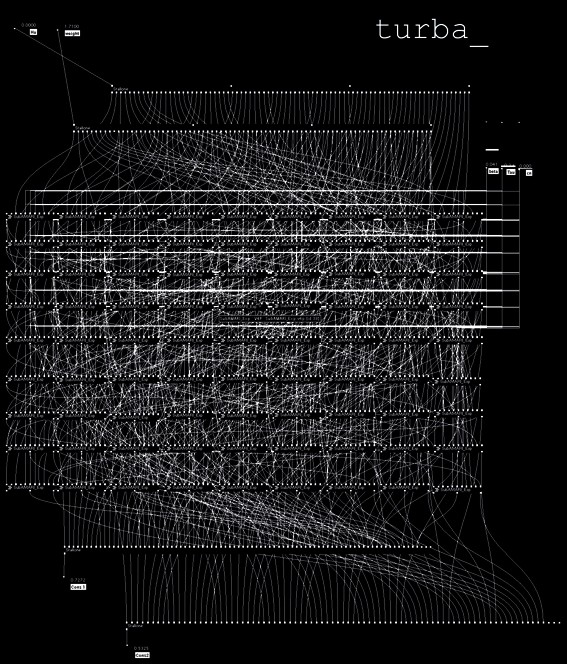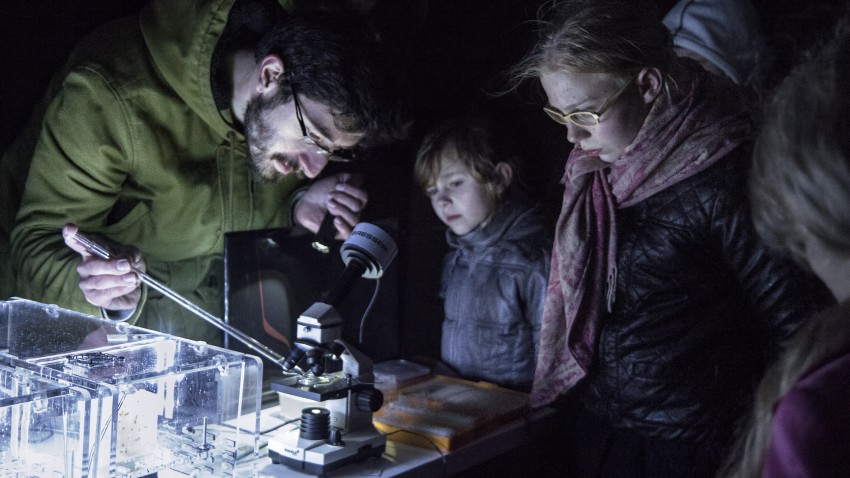Blog
Blog-posts are sorted by the tags you see below. You can filter the listing by checking/unchecking individual tags. Doubleclick or Shift-click a tag to see only its entries. For more informations see: About the Blog.
credits bit_arTék
In bit_arTék we have created a software to design professional lighting.
vvvv power used to handle real-time data.
We invite vvvvis technicians use to perform their work.
We encourage users to share their modules to create a growing resource content and thus be less dependent on commercial programs.
https://sites.google.com/site/vvvvisbitartek/vvvvis
credits Marcello Gómez Maureira, Carolien Teunisse
Where the obstruction of light is often an unwanted artefact in projection-based AR installations, we explore shadows as dynamic canvases for supplementary projections. In defining shadow areas with your own body, visual information can be discovered in a playful way.
Visual art, educative content presentation, and gameful design converge to bring forth an interactive display that augments exhibition models in museum environments.illuminating-shadows.com
Kinect, 2 projectors, vvvv
credits went into the tumblr captions
old neü is the logbook of bucharest based visual maker ion cotenescu
combinig spatial context and cgi, cote has been keen on bringing CAD flair to party situations
as a tech tributary to contemporary media platform vvvv, he has found himself branching out interests from visual syntax into interaction- and light-design
also,
if there is a v4 coagulation out there on tumblr, please drop a message
credits Andrej Boleslavský
The ArchiBio project discovers phenomena that surround us everywhere, yet they remain invisible. The growth of bacteria, fungi and plants, life of an ant colony – the beauty of these phenomena escapes our attention, because they exist on a different scale or in a different time beyond our perception.

ArchiBio videomapping unfolds the beauty of microscopic worlds enlarged to a giant size in the public space. It poses a question whether the relationship between nature and technology really is antagonistic, or whether the man-made technologies represent just another branch on the evolutionary tree. It is fascinating that all life forms around us share the same operating system with us, humans, DNA. What will happen once our technologies learn how to cooperate with it? Will genetic modification bring destruction or progress?

The project is being created especially for the Prague festival of light, Signal Festival.
The preparatory work included creative, technology and scientific research. The author used 3D scanning technologies, 3D printers and computer-controlled cutting machines to make special cultivation pots of the shape of which will copy selected architecture.
Featured by Czech the light czechthelight.cz
Commissioned by Signal signalfestival.com
Partner LVR lvr.fel.cvut.cz
Video Mária Júdová, mariajudova.net
Music Ambienteer - Ecclesia
Special thanks:
Jan Buriánek, bursoft.org
Thanks:
Iva Dobiášová
Radka Hanečková
Jakub Hybler
Marko Júda
team Signal
Project by Andrej Boleslavský
id144.org
credits Chris Plant/catweasel, Claudia Paz, Nicholas Cheung, Cesar Castro
I was commissioned to program this Art piece and Interactive Installation design by Claudia Paz and Nicholas Cheung for BCP institutional building in San Isidro, the center of the commercial district of Lima - Perú
Ecue drives the LEDs from a DVI feed from vvvv and also does the scheduling, the touch panel is made of 72 Sensacel tiles.
There are 5 layers of iFlex 270pixels high and 9 wide, and the poles have archi points at their tips making a total of 26,182 pixels
http://www.colorkinetics.com/showcase/installs/BCP-Affinity/
credits stain, ::vtol::
“...the time is out of joint” - Shakespeare
This staging is an algorithmic interpretation of "Comedy of errors" by William Shakespeare where luminescent lamps perform the play in accompaniment of generative sound and graphics - all based on the original text.
Here lamps are actors, and projected scenery represents constantly flowing river. Text is the structural basis and joint of the time.
http://stain.ws/THE-COMEDY-OF-ERRORS
http://vtol.cc/filter/works/comedy-of-errors
http://prostheticknowledge.tumblr.com/post/84423671091/the-comedy-of-errors-installation-by-stain-and

TURBA is a networked system consisting of 64 neural oscillators, which have been randomly linked and are subject to variables of interconnection.
Thus, any behavior generated by these oscillators is programmed explicitly: no sound, no movement, no pattern are products of a specific and previous approach, but are the result of the network structure and their connective processes. None of its components is the engine or timer for that behavior, but all act contagiously among them.
The oscillators perform, but have no plans.
But if this system receives feedback from the cadences that he generates, the work creates disturbingly similar rhythms to the movement of an organic body, carrying the workpiece to emergent behaviors of synchrony, chaos or collapses ...

more information:
http://patxiaraujo.com/portfolio/turba-_concierto-en-15-movimientos-para-64-osciladores-neuronales/
To Be Reproduced is an interactive video installation that revisits the classic painting Not to be Reproduced a work made in 1937 by the Belgian surrealist painter René Magritte. The installation reflects on the pervasiveness of virtual spaces that have become an integral part of our daily social lives, and the way data traces are used to build sophisticated reproductions of the user.
In To Be Reproduced the viewer enters a hybrid space where the physical and the virtual world are closely intertwined. Positioned in front of the mirroring plane the viewer is enveloped in a virtual space where it meets a faceless digital reproduction of itself. As other participants are mirrored correctly the viewer takes on the role of the person depicted in Magritte’s painting.
This uncanny representation of the faceless user in a graphical point cloud refers to the voyeuristic nature of modern communication culture and to the data traces that are used to generate sophisticated consumer profiles. Instead of depicting people by mimicking nature, models are in-formed by analyzing metadata.
credits elliotwoods mimison
Kimchi and Chips create phantoms of light in the air, crossing millions of calibrated beams with their work Light Barrier, 2014. The light installation creates floating graphic objects which animate through space as they do through time.
A fascination with natural light drove the technique of the impressionist painters, they explored new qualities of colour and the trail of time. Kimchi and Chips' study of digital light discusses a new visual mechanic, their installation adding to the visual language of space and light. As the artist's inquiry deepens, brush strokes become descriptive like code, detailing reality and allying light with canvas.
Light Barrier was co-commissioned by FutureEverything and the British Council. It premiered at New Media Night Festival, Nikola-Lenivets 4–6 June 2014.
Additional images and video from Alexander Delovoy and Tom Higham.
http://www.kimchiandchips.com/#lightbarrier
http://www.creativeapplications.net/vvvv/light-barrier-millions-of-calibrated-light-beams-create-floating-phantoms-in-the-air/
anonymous user login
Shoutbox
~1yr ago
~1yr ago
~1yr ago
~1yr ago
~1yr ago
~1yr ago
~1yr ago
~1yr ago
~1yr ago
~1yr ago




